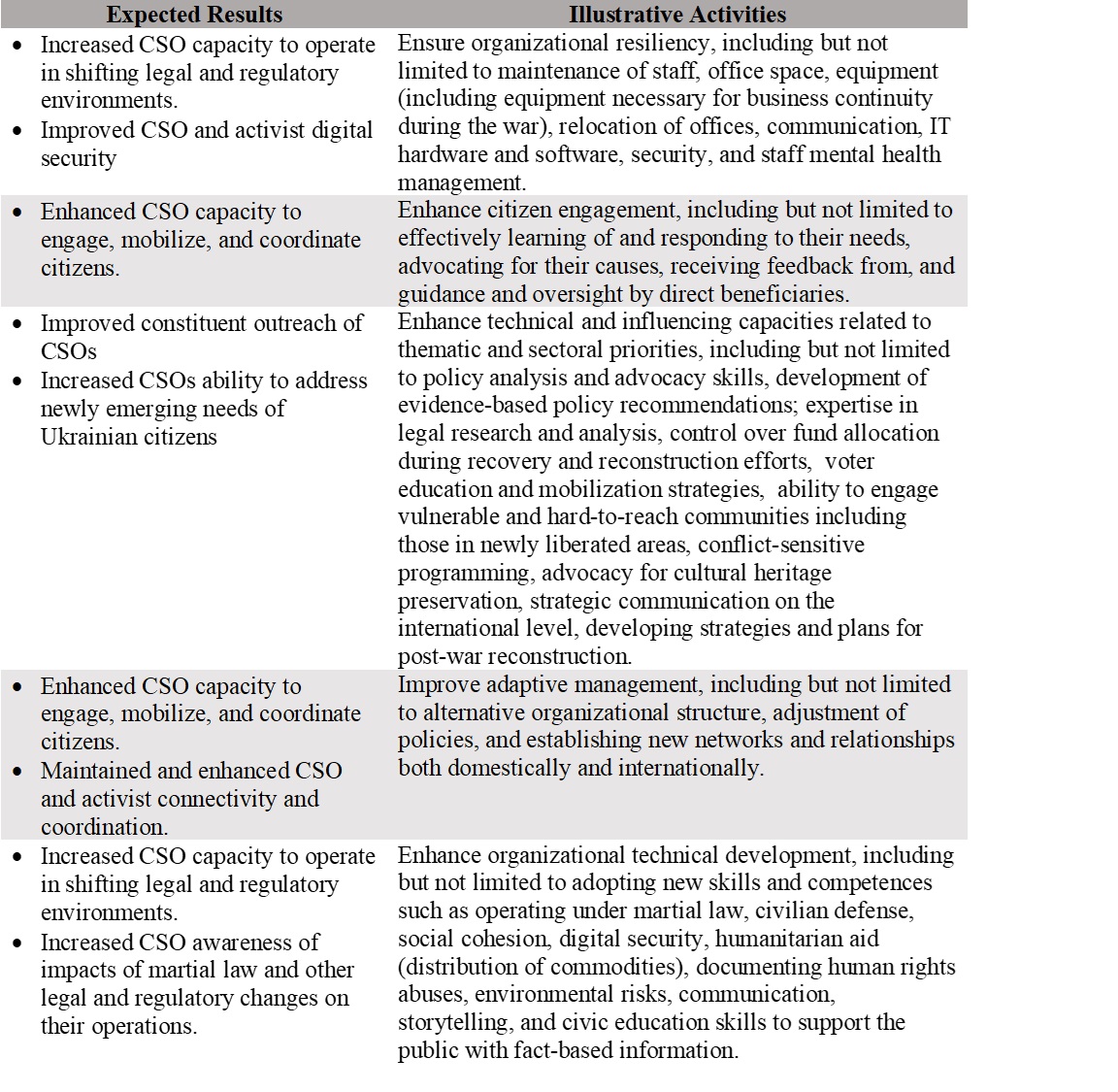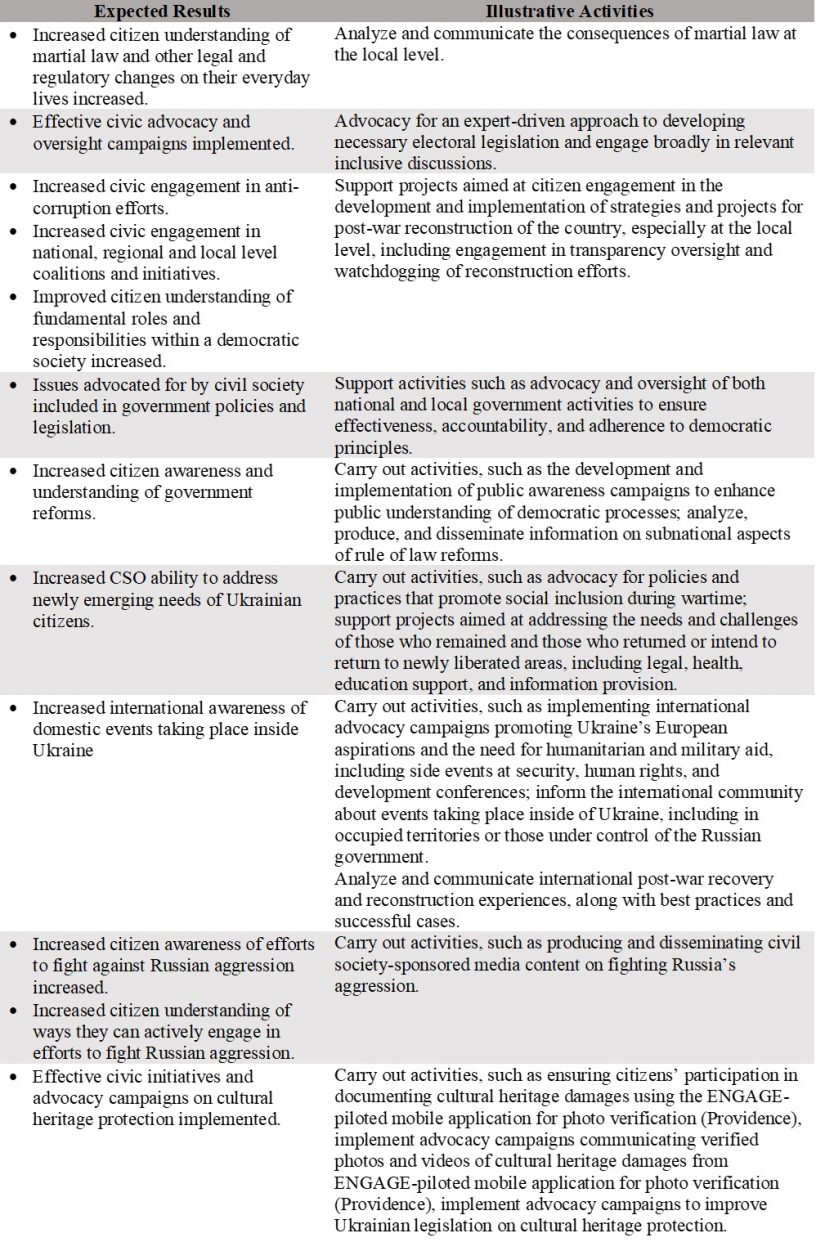INSTITUTIONAL AND PROJECT GRANTS
This is an open-ended competition. Pact will review applications on a rolling basis.
This Request for Applications (RFA) is part of the Enhance Non-Governmental Actors and Grassroots Engagement Activity funded by the US Agency for International Development (USAID) and implemented in Ukraine by Pact (USAID/ENGAGE). USAID/ENGAGE will provide support to national, regional, or local organizations and coalitions, including established CSOs, as well as unregistered groups and informal civic initiatives nationwide. The purpose of USAID/ENGAGE is to increase citizen awareness of and engagement in civic activities at the national, regional, and local level. More detailed USAID/ENGAGE Activity description can be found here.
Pact is an international nonprofit that works in nearly 40 countries building solutions for human development that are evidence-based, data-driven and owned by the communities we serve. Our vision is thriving, resilient, and engaged communities leading their own development.
Background
Ukraine’s development context demands constant caution and planning for prompt adaptation to unforeseen circumstances, addressing unanticipated shifts in the political and economic environment. USAID/ENGAGE, in line with Pact’s flexible and adaptive approach for responding to emerging threats and opportunities, manages a rapid-response facility to support vital evolving initiatives tackling imminent needs.Today Ukraine is forced to fight simultaneously in two different directions. Externally, it deals with Russia’s unprovoked and unjustified invasion of the country, threatening civilian life, infrastructure and the very existence of its polity. Internally, Ukraine faces significant challenges such as combating corruption, strengthening the rule of law, and addressing ongoing state finance, public administration, and decentralization reforms. These issues remain at the forefront of the national agenda for both the government and civil society.Ukraine’s commitment and capacity to progress towards self-reliance is hampered by this ongoing two-front war – against Russia’s full-scale aggression on the one hand, and against its internal legacy of corruption on the other. The vibrancy of Ukrainian CSOs is often cited as a defining strength in Ukraine’s democracy, one that markedly distinguishes Ukraine from other post-Soviet countries. Russia’s aggression, which threatens the lives of Ukrainians and the country’s sovereignty and territorial integrity, also poses an existential threat to Ukrainian CSOs, activists, and their initiatives. The millions who internally relocated or seek temporary protection in other countries include hundreds of civil society representatives. Many civilians who oppose the aggression are reported missing.
With the outbreak of Russia’s unprovoked and unjustified invasion of Ukraine, the entirety of CSO infrastructure sustained long-term damage. The non-governmental sector continues to struggle to
ENGAGE Enhance Non-Governmental Actors and Grassroots Engagement operate. The daily hardships faced by Ukrainians also take their toll on civic activists and professional CSO staff. Consequently, the sector had adapted its priorities and approaches to support Ukrainian citizens. CSOs’ adaptation revealed new needs of CSOs, including advancing highly technical knowledge in emergent sectoral demands, new or altered forms of direct citizen engagement, addressing specific needs of citizens in newly liberated areas, mobilizing international solidarity and support. Despite the ongoing aggression and violence, Ukraine’s European aspirations are gaining impetus. To cater to these ongoing and emergent CSO priorities, we have re-adapted our rapid-response facility accordingly.
Purpose of the Request for Applications
The purpose of this RFA is to increase citizen awareness and engagement in democratic participation and government oversight at all levels. It seeks to empower civil society organizations to address the immediate and evolving needs of citizens in their pursuit of democratic participation. Additionally, it supports them in areas that have arisen as a result of Russia’s aggression, which are vital for Ukraine’s continued democratic development.
Within this RFA, the main focus of institutional core support will primarily target subnational CSOs that possess a strong influence and presence in their respective regions, and whose access to and engagement with citizens is vital for ensuring the long-term sustainability of democratic participation.
Project support will be available to both national and subnational organizations, further enhancing citizen awareness of and engagement in civic activities at the national, regional, and local levels.
Thematic and Sectoral Priorities
In the framework of this RFA, it is anticipated that new awards will stress the following priorities:
- Improve national democratic governance.
- Improve the rule of law.
- Promote effective government accountability and public oversight.
- Improve the electoral processes.
- Advance social inclusion and cohesion.
- Protect, preserve, and promote Ukraine’s cultural heritage.
- Promote Ukraine’s voice in the world.
- Ensure direct citizen engagement in post-war reconstruction.
General conditions under all subawards include:
- Emphasize increasing active citizen participation in democratic decision-making, turning more passive awareness into active engagement.
- Build not only on existing experiences and relationships but also demonstrate a clear intention to embark on unexplored paths to address unmet needs, especially by reaching vulnerable and marginalized constituencies.
- Leverage financial and in-kind contributions from the private sector, citizens, or, when practical and not presenting a conflict of interest, the government.
- Include sustainability plans that articulate and evidence the legacy of activities after ENGAGE support ends.
- Demonstrate opportunities for public-private partnerships.
Expected Results and Illustrative Activities
Upon completion of the grant, applicant organizations will have to demonstrate achievement of one or more of the following results, along with the illustrative activities provided below:
a) Institutional core support, primarily to subnational organizations, networks, and coalitions
b) Project support to national and subnational organizations, networks, and coalitions
Eligibility
- Officially registered CSOs, unregistered groups, and informal civic initiatives from all regions of Ukraine, as well as Ukrainian CSOs established abroad, are eligible to apply.
•As part of this competition, Pact cannot award grants to business organizations, political parties, government institutions, or individuals.
Evaluation Criteria
Each application will be evaluated against the following criteria based on its own merit:
• Relevance to the stated goals and themes of the RFA (25%)
• Technical approach to addressing the stated problem of the applicants’ proposal (25%)
• Ability to serve and engage directly with citizens, and convene a wide range of governmental and non-governmental stakeholders (30%)
• Ability to deliver the expected results of the RFA (20%)
Tentative Duration of Grants: Independent of their start date, all subawards must end before June 30, 2025.
Grant Amount: Each institutional core support subaward’s expected ceiling is $200,000. Each project support subaward’s expected ceiling is $50,000 per 12 months.2 Larger amounts will be considered by Pact if they are reasonable and strongly justified.
Applicants should submit their budgets in the Ukrainian Hryvnia.
Please note that Pact makes payments to its subawardees only via wire transfer. Unregistered groups and informal civic initiatives should apply for this competition in partnership/consortium with an officially registered CSO that agrees to administer the initiative’s funds.
There is no deadline for submission of the applications: This is an open-ended competition. Pact will review applications on a rolling basis. Applicants will receive feedback within two weeks of the date Pact receives a complete grant application package. Pact reserves the right not to inform apparently unsuccessful applicants. No applications will be accepted after May 15, 2025.
Application Process
Submit completed applications by e-mail to grants.engage@pactworld.org with the subject: “Response to RFA P4767-2023-20.”
Complete application package:
(1) Completed application form (form available by the link below).
(2) Annexes:
o SRRA Snapshot Form for Subrecipients.
o For registered organizations: proof of legal status.
o For unregistered groups or informal civic initiatives: MOUs, support letters, guarantee letters, or other documents between the applying group and their CSO partner, which needs to be legally registered.
Additional technical notice:
•Short-listed applicants will be requested to submit a full detailed budget and accompanying detailed budget narrative.
•Short-listed applicants will be required to have a SAM.gov Unique Entity ID (UEI) number (a twelve-digit identification number required for all procurement-related activities) to be able to receive funds.
•Short-listed applicants will undergo a risk and responsibility assessment within Pact’s due diligence process.
Terms and Conditions
Standard provisions: The Standard Provisions for Non-U.S. Non-Governmental Organizations as applicable will apply to these grants.
Unallowable expenses: Pact does not fund procurement of:
•Abortion equipment and services.
•Agricultural commodities.
•Commodities and services for support of police or other law enforcement activities.
•Construction works.
•Fertilizer.
•Luxury goods and gambling equipment.
•Military equipment.
•Motor vehicles.
•Pesticides.
•Pharmaceuticals.
•Surveillance equipment.
•Used equipment.
•U.S. Government-owned excess property.
•Weather modification equipment.
For the full list of unallowable expenses, please consult paragraphs M1, M6, M14, M20, and M29 of the Standard Provisions for Non-U.S. Non-Governmental Organizations cited above.
Permission for use and disclosure: By applying under this RFA, the applicant consents to the disclosure of the documents submitted by the applicant to the reviewers involved in the selection process. Please note that all reviewers are bound by non-disclosure agreements.
Disclaimers:
•Pact may cancel the solicitation and not award any funds.
•Pact may reject any or all applications received.
•Issuance of solicitation does not constitute award commitment by Pact.
•Pact reserves the right to disqualify any application based on applicant’s failure to follow solicitation instructions.
•Pact will not compensate applicants for their response to the solicitation.
•Pact reserves the right to issue an award based on initial evaluation of applications without further discussion.
•Pact may choose to award only part of the activities in the solicitation or to issue multiple awards based on the solicitation activities.
•Pact reserves the right to waive minor application deficiencies that can be corrected prior to
award determination to promote competition.
•Pact may contact applicants to confirm contact person, address, and that the application was submitted for this solicitation.
•Pact may contact listed past performance references without notice to the applicant. Pact also reserves the right to contact other past performance information sources that the applicant did not list in the application.
•By applying, the applicants confirm they understand these terms and conditions.
Questions About this RFA
If you have questions, please submit them electronically to grants.engage@pactworld.org The email subject line should read “Questions on RFA P4767-2023-20 – name of the organization submitting the question.” Questions to this RFA will be answered case-by-case, as well as presented as Frequently Asked Questions (FAQ) alongside this RFA.




